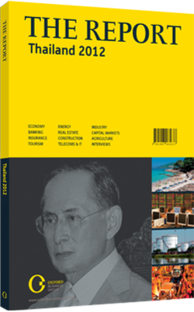OBG talks to Boonsong Teriyapirom, Minister of Commerce

Interview: Boonsong Teriyapirom
What are Thailand’s priorities for its trade policy?
BOONSONG TERIYAPIROM: We are on what I like to call a dual-track policy: we want to increase domestic consumption, and at the same time we are targeting a 15-20% year-on-year (y-o-y) increase in our total exports this year. We have been meeting with the leaders of our key trading partners and are aiming to double the size of our trade with partner countries in the next five years. This means we will actually have to sustain 20% y-o-y growth in exports over the next five years. We are also focusing on the process of ASEAN economic integration by 2015.
We have been watching Europe’s economic situation closely, but they seem to be moving forward in resolving the issues. So we are just hoping that they will get back on track. In the meantime we are concentrating on the ASEAN Economic Community and are placing more emphasis on regional markets. We are also focused on the ASEAN free trade agreements, which include China, India, Japan, South Korea, Australia and New Zealand.
Where are this administration’s subsidies focused?
BOONSONG: Following the election in July 2011 an we increased the minimum wage to BT300 ($9.75) a day and the minimum starting salary of university graduates to BT15,000 ($478.50) a month. We also have to maintain the prices of agricultural products to ensure that farmers earn enough for a good standard of living. Sometimes we have to intervene in the pricing of some agricultural products, which is why we have the policy of supporting the price of rice and tapioca, among other seasonal crops. This will be a domestic policy, and it will not be long term.
We sometimes have to keep stockpiled agricultural products for a while, before we bring it out and export it. This will be done at the right time, through government-to-government type deals. As for rice, many countries are rice exporters, such as Vietnam, India, Cambodia, the US and others. In 2012 the world’s consumption of rice is expected to increase, so when the right time comes we will also bring out our stock.
What is the role of intellectual property (IP) rights in driving higher-value-added production?
BOONSONG: Our IP Department is encouraging private individuals and businesses to bring their ideas and innovations to us to get patents. This is one way to create value for their ideas, which can in turn be commercialised. Since the department was founded, however, the number of patents granted has been minimal, and we would like to see it increase.
The department is working hard on improving IP protection, building on our established legal framework. We have reached agreements and shared information with many other countries around the world for IP and patent agreements. We are cooperating with Japan and other neighbours, the EU and the US for instance. In recent months we have been able to take action against a growing number of IP infringers.
How has the rising value of the baht in recent years influenced Thailand’s trade patterns?
BOONSONG: There is a positive and negative impact on both sides. For exports, those who are not prepared or able to hedge their exchange rate exposure might be affected by the appreciation of the baht. On the other hand, foreign investors who are producing products in Thailand and rely on imported raw materials will benefit from this by exporting at a lower cost.
We are also urging Thai firms to invest abroad. We discussed this with the Board of Investors, the Ministry of Industry and others. PTT, for example, has made significant investments abroad, generating large profits from foreign markets and benefitting from the exchange rate rise. We are encouraging our small and medium-sized enterprises (SMEs) to go abroad, first partnering with neighbouring SMEs in ASEAN and Japan. Likewise, Japan is also encouraging its own SMEs to move into ASEAN for investments, so we will see more collaboration between SMEs from the two regions. Eventually, we hope to urge Thai firms to be more ambitious in international investments and go beyond the region.
You have reached the limit of premium articles you can view for free.
Choose from the options below to purchase print or digital editions of our Reports. You can also purchase a website subscription giving you unlimited access to all of our Reports online for 12 months.
If you have already purchased this Report or have a website subscription, please login to continue.

